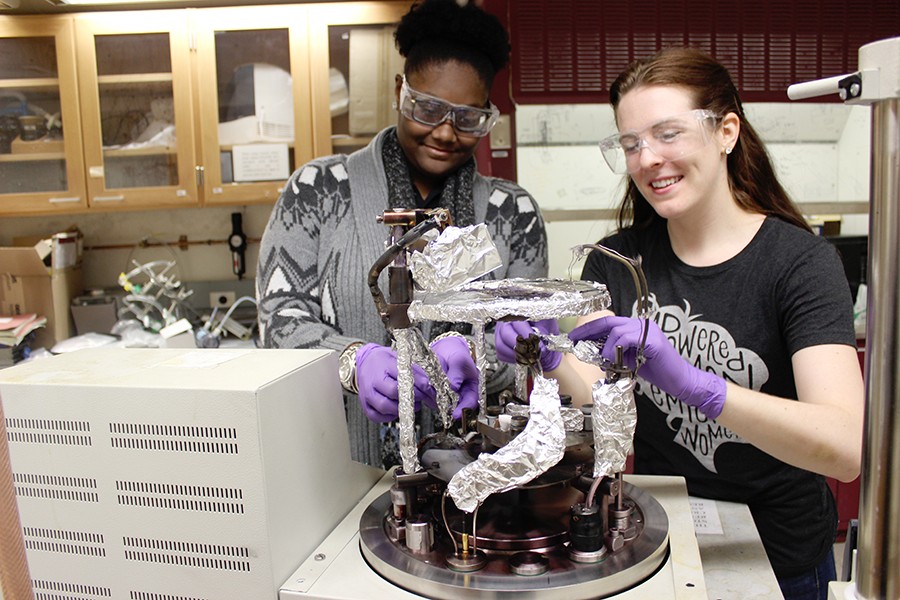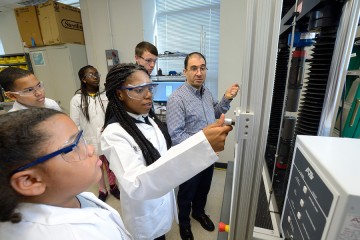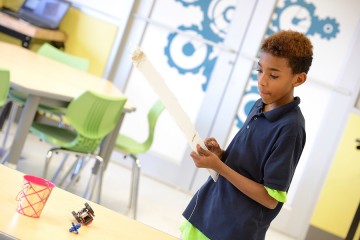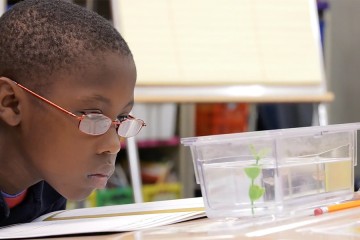While many of her classmates at Baltimore City's Western High School are hanging out with friends or participating in clubs after school, Devyn Anderson is in a materials science laboratory on Johns Hopkins University's Homewood campus, working to develop a sensor that can detect proteins associated with Methicillin-resistant Staphylococcus aureus, otherwise known as MRSA.
"I'm handling antibodies and polymers and equipment like thermal evaporators and probe stations, and it is a big challenge," she says. "But it's also pretty exciting."
A 16-year-old junior, Anderson is part of Johns Hopkins' Women in Science and Engineering program, which brings female high school students to campus to work in engineering and science laboratories, where they conduct real research under the guidance of faculty and graduate student mentors.
This fall and winter, the WISE program welcomed three students from Western High School, an all-girls public high school in Baltimore City; and 11 from Garrison Forest School, an all-girls independent school in Owings Mills, Maryland, to spend two afternoons a week doing research in areas including chemical engineering, materials science, and computer science. Next month, after the current cohort of students finishes up, a new cohort from the two schools will take their places.
The aim of the program is to encourage girls to pursue education and careers in science, technology, engineering, and mathematics, according to Margaret Hart, from the Center for Educational Outreach, which runs the program.
"WISE provides high school students with a real taste of what being a researcher is like," Hart says. "They learn a lot of skills they will need to be successful in a research lab, but also the skills they need to do anything they want to do—tenacity, attention to detail, curiosity, patience, and most importantly, how to recover from failure."
Anderson says the program not only has taught her a lot about materials science, but also improved her time-management skills and bolstered her confidence.
"Being part of WISE has been extremely worthwhile for a lot of reasons, including the fact that it gave me experience in juggling a lot of things at once and handling challenges that were completely new to me," Anderson says. "I think it has also made me more confident in general."
Jennifer Dailey, a materials science graduate student serving as Anderson's mentor in the laboratory of Whiting School Professor Howard Katz, is not surprised to hear that. She believes that WISE has a profound impact in a number of ways.
"For one thing, they learn some specific advanced topics in physics, chemistry and engineering, which can only help them in their future studies," Dailey says. "But perhaps even more important, it encourages young women to explore a whole new world of career possibilities that may never have occurred to them before."
Take Miyanna Hunt, for example. A 17-year-old junior at Western High School, she spent this fall and winter working with mentor Pengfei Xie in Chao Wang's chemical and biomolecular engineering laboratory. Before WISE, Hunt imagined herself someday going to medical school. Now she is considering other options, too.
"I can say for sure that this program has broadened my horizons," Hunt says. "I've always been interested in the medical side of science, and thought going to medical school was pretty much the only option. Now I know that there are great things being done in chemical and biomolecular engineering, too. Going forward, I now have another option that I didn't even know about before this."
Posted in Science+Technology, University News, Community
Tagged community, stem education, center for educational outreach











